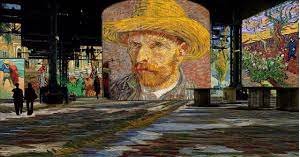
For a philosophy of the look
It already exists, I even looked for the roots and couldn’t find it and that’s where the problem lies, dialoguing with what is present in culture, philosophy and art about what the look is and how it is possible to develop it from there onwards in order to dialogue with contemporary culture.
the problem lies, dialoguing with what is present in culture, philosophy and art about what the look is and how it is possible to develop it from there onwards in order to dialogue with contemporary culture.
For example, a good reading of Schiller we have already mentioned this week his “Aesthetic education of man”, in art I did not quote Gustav Klimt on purpose, he has elements of symbolism and all art literature recognizes it, but his “art nouveaux” brings something again (photo of his work the hug).
Edgar Morin, when analyzing “Mass culture of the 20th century”, emphasizes the multiple meanings of modern man: “the language adapted to this anthropos is audiovisual, the language of four instruments: image, musical sound, word, writing. A language that is all the more accessible insofar as it is the polytonic involvement of all languages” (page 45) and thus this look can be both dispersed and integrated, giving this new language a new look.
It is no longer specific to a single medium (sound, image and objects have existed as art since time immemorial), for Morin this is “of the game that lies on the fabric of practical life” (idem) and this symbolism in Klimt is in fact a vision integrated, but not specific to him, I also see it in Kandinsky his works also seem to have music and poetry, even though they are just pictures.
In cinema, the Japanese director Akira Kurosawa, in one of the paintings of this film Life, integrates painting and cinema by giving movement to Van Gogh’s paintings, thus, more than multimedia, these artistic movements can be called transmedia, due to the fact that they integrate aspects of art .
This re-educates and stimulates the look, but there is the aspect of the possibility of dispersing the look, but nothing can do this more than modern horizontal monomedia and social “media” are not out of it, so the re-education of the look goes through the stimulation of other senses and the spiritual that is not that idealist (see previous post) that are separated.
So, despite being a symbolist, it is fair to think of Klimt as a member of “art nouveaux”, since he helped to create the Secession Movement in Vienna, whose objective was to break the conservative traditions that were rooted in history and create an internationalist and comprehensive vision. of contemporary and timeless artistic genres.
The integration of this vision in new media is the presentation at the historic Atelie des Lumiéres, in Paris, of a transmedia animation of Vang Gogh (foto), which inaugurated a series in 2018 precisely with the work of Gustav Klimt also animated.
For this reason, it is not a synthesis of opposites, but the fusion of artistic horizons in movement, the current crisis is the dualistic vision of the world, of art and of values that are timeless.
MORIN, Edgar. (1997) Cultura de massas do século XX (Twentieth-century mass culture(. trans. Maura Ribeiro Sardinha. 9th. edition. Brazil, Rio de Janeiro, Forense ed., 1997.









